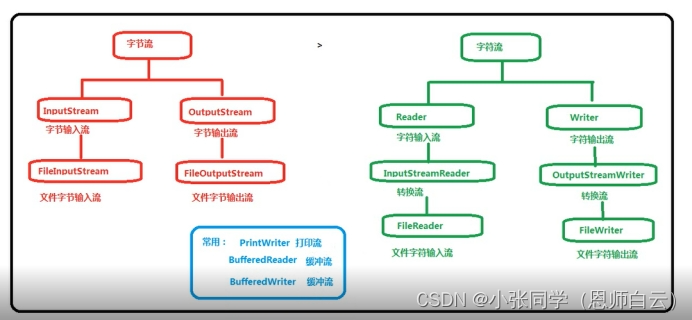I/O流

InputStream、OutputStream、FileInputStream、FileOutputStream(字节流)
字节输入流InputStream主要方法:
read() :从此输入流中读取一个数据字节。
read(byte[] b) :从此输入流中将最多 b.length 个字节的数据读入一个 byte 数组中。
read(byte[] b, int off, int len) :从此输入流中将最多 len 个字节的数据读入一个 byte 数组中。
close():关闭此输入流并释放与该流关联的所有系统资源。
字节输出流OutputStream主要方法:
write(byte[] b) :将 b.length 个字节从指定 byte 数组写入此文件输出流中。
write(byte[] b, int off, int len) :将指定 byte 数组中从偏移量 off 开始的 len 个字节写入此文件输出流。
write(int b) :将指定字节写入此文件输出流。
close() :关闭此输入流并释放与该流关联的所有系统资源。
字节流的方式效率较低,不建议使用
案例
public class IOTest {
public static void main(String[] args) throws IOException {
File file = new File("D:/test.txt");
write(file);
System.out.println(read(file));
}
public static void write(File file) throws IOException {
OutputStream os = new FileOutputStream(file, true);
// 要写入的字符串
String string = "松下问童子,言师采药去。只在此山中,云深不知处。";
// 写入文件
os.write(string.getBytes());
// 关闭流
os.close();
}
public static String read(File file) throws IOException {
InputStream in = new FileInputStream(file);
// 一次性取多少个字节
byte[] bytes = new byte[1024];
// 用来接收读取的字节数组
StringBuilder sb = new StringBuilder();
// 读取到的字节数组长度,为-1时表示没有数据
int length = 0;
// 循环取数据
while ((length = in.read(bytes)) != -1) {
// 将读取的内容转换成字符串
sb.append(new String(bytes, 0, length));
}
// 关闭流
in.close();
return sb.toString();
}
}
BufferedInputStream、BufferedOutputStream(缓冲字节流)
缓冲字节流是为高效率而设计的,真正的读写操作还是靠FileOutputStream和FileInputStream,所以其构造方法入参是这两个类的对象也就不奇怪了。
案例
public class IOTest {
public static void write(File file) throws IOException {
// 缓冲字节流,提高了效率
BufferedOutputStream bis = new BufferedOutputStream(new FileOutputStream(file, true));
// 要写入的字符串
String string = "松下问童子,言师采药去。只在此山中,云深不知处。";
// 写入文件
bis.write(string.getBytes());
// 关闭流
bis.close();
}
public static String read(File file) throws IOException {
BufferedInputStream fis = new BufferedInputStream(new FileInputStream(file));
// 一次性取多少个字节
byte[] bytes = new byte[1024];
// 用来接收读取的字节数组
StringBuilder sb = new StringBuilder();
// 读取到的字节数组长度,为-1时表示没有数据
int length = 0;
// 循环取数据
while ((length = fis.read(bytes)) != -1) {
// 将读取的内容转换成字符串
sb.append(new String(bytes, 0, length));
}
// 关闭流
fis.close();
return sb.toString();
}
}
InputStreamReader、OutputStreamWriter(字符流)
字符输入流Reader主要方法:
read():读取单个字符。
read(char[] cbuf) :将字符读入数组。
read(char[] cbuf, int off, int len) : 将字符读入数组的某一部分。
read(CharBuffer target) :试图将字符读入指定的字符缓冲区。
flush() :刷新该流的缓冲。
close() :关闭此流,但要先刷新它。
字符输出流Writer主要方法:
write(char[] cbuf) :写入字符数组。
write(char[] cbuf, int off, int len) :写入字符数组的某一部分。
write(int c) :写入单个字符。
write(String str) :写入字符串。
write(String str, int off, int len) :写入字符串的某一部分。
flush() :刷新该流的缓冲。
close() :关闭此流,但要先刷新它。
另外,字符缓冲流还有两个独特的方法:
BufferedWriter类newLine() :写入一个行分隔符。这个方法会自动适配所在系统的行分隔符。
BufferedReader类readLine() :读取一个文本行。
字符流适用于文本文件的读写,OutputStreamWriter类其实也是借助FileOutputStream类实现的,故其构造方法是FileOutputStream的对象
案例
public class IOTest {
public static void write(File file) throws IOException {
// OutputStreamWriter可以显示指定字符集,否则使用默认字符集
OutputStreamWriter osw = new OutputStreamWriter(new FileOutputStream(file, true), "UTF-8");
// 要写入的字符串
String string = "松下问童子,言师采药去。只在此山中,云深不知处。";
osw.write(string);
osw.close();
}
public static String read(File file) throws IOException {
InputStreamReader isr = new InputStreamReader(new FileInputStream(file), "UTF-8");
// 字符数组:一次读取多少个字符
char[] chars = new char[1024];
// 每次读取的字符数组先append到StringBuilder中
StringBuilder sb = new StringBuilder();
// 读取到的字符数组长度,为-1时表示没有数据
int length;
// 循环取数据
while ((length = isr.read(chars)) != -1) {
// 将读取的内容转换成字符串
sb.append(chars, 0, length);
}
// 关闭流
isr.close();
return sb.toString()
}
}
//缓冲字符流
public static void write(File file) throws IOException {
// BufferedWriter fw = new BufferedWriter(new OutputStreamWriter(new
// FileOutputStream(file, true), "UTF-8"));
// FileWriter可以大幅度简化代码
BufferedWriter bw = new BufferedWriter(new FileWriter(file, true));
// 要写入的字符串
String string = "松下问童子,言师采药去。只在此山中,云深不知处。";
bw.write(string);
bw.close();
}
public static String read(File file) throws IOException {
BufferedReader br = new BufferedReader(new FileReader(file));
// 用来接收读取的字节数组
StringBuilder sb = new StringBuilder();
// 按行读数据
String line;
// 循环取数据 readLine读取一行
while ((line = br.readLine()) != null) {
// 将读取的内容转换成字符串
sb.append(line);
}
// 关闭流
br.close();
return sb.toString();
}























 83
83











 被折叠的 条评论
为什么被折叠?
被折叠的 条评论
为什么被折叠?










